not Socialist. -- millions in all the great powers rep't & every great parliament.
Mazzini
Trades Unions self interest [scientists] [etc.]
but the huge [immigrations] of labor.
Ruthenians -- Italians in Rhine.
1914 -- U.S. in 1,218,000.
[U.S.] out 483,000.
↑Italians in↓ South Am. crossing equator twice learn to know each other -- factions mix them as well
This Conference has spoken of 10 million [illegible] in Africa affording the ↑same↓ temptations [of] ↑for exportation as↓ the Congo rubber ↑in the Congo or diamonds in the↓ Kimberley diamonds ↑mines.↓
Labor lacking protection of stable gov't should be afforded international protection -- Prof Hull's plan during war. So African colonies [at head?] of Inter. Commission, could grow into [prominent] international control of the ↑undeveloped portion of↓ the [illegible] [page 2] emotional experiences & parting [illegible] for new ties
simplicity of life to which the one [reduced] -- making [illegible] [page 3]
Modern wars not ↑so much↓ [quarrels] as situations to be adequately treated only [through] Inter. agency not yet created Europe of 1914 -- [illegible]
[Baghdad?] R.R.
corridors to the sea
warm water harbors [etc.]
world [possesses] no machinery save war for making changes when they are due [page 4]
3 instincts or aspects of human nature making for international comity may ever be the determining factors in [ending] the war
(1) What the Russian peasant [Bondarev] called "Bread Labor"
Hungarian story.
(2) Instinct of Workmanship
Wells def. destructive & dispersive ↑[industries?]↓ versus constructive & accumulative. How long will workmen be content
(3) The reverence for food felt by humble people the world over.
truck story
outrages their sense of decency. [page 5]
On May 27" a mass meeting in Chicago discusses "The terms of Peace" ↑[written at bottom of the page] and the following Thursday a mass meeting in N.Y. urging that the terms of peace be considered in the light of the Russian Rev. demands is again [considered] in the [newest?] terms --↓ & is severely reprimanded for lack of patriotism by the Chi. Tribune.
The very next Sunday June 3d the Tribune comes out with an editorial recommending that the U.S.A. in recognition of its service in the war should remain at the time of [illegible] the ↑islands off the [Caribbean] now in the possession of the↓ French & British.
The Tribune finds no lack of patriotism in discussing the terms of peace from the imperialistic stand point & is urging upon its readers the [page 6]
It would I think require a poet to make clear this attitude of the simplest men to the fruits of the Earth, to the product of their toil.
That ancient kindliness that sat beside the cradle of the race.
immigrants turned into kindly citizens of the world
conduct to the members within the tribe
[conduct] to those outside.
emotional experiences of parting.
ready to form new ties
the human dynamic character of internationalism
the most conservative of all beliefs -- the belief in the common man [page 7]
The instinct of workmanship of the mechanic
the "land hunger" of the peasant, may ↑yet↓ become great human factors in this war
When we were in Hungary in 1915 we were 3 Aus. 10 Russians, allowed free to go back to get [35] more because they had heard that the Russian prisoners had been put to work on land, they said quite simply that spring had come & that it was time they got to work as Europe has settled down into the business of war, anticipating the possible duration for years to come.
One is reminded of Mr Wells' definition ↑description↓ of the war that it ↑war↓ is merely a destructive & dispersive ↑industrialism in place supplanting the↓ instead of a constructive & accumulative industrialism with which we are familiar. [page 8]
I was in Paris during the Boer War, as you ↑living in↓ [illegible] of the women working [illegible] neighborhood, & one morning [found] the entrance to the studio building in wh I was [living?] blocked with excited [working] people men & women wildly excited over the news in the morning papers. The report had come that the British troops were burning the [granaries], were [slaughtering] the cattle & ↑after covering the carcasses with oil were↓ burning them in great piles in order to lessen the food supply.
This seemed to the thrifty French some thing that could not be borne. [page 9]
10 millions [illegible] in Africa
[Caribbean] exploitations
There should be international protection & direction afforded to such labor as lacked the protection of a stable gov't
for quite as the diamond mines in [Kimberley] attracted capitalists or as the
Prof [Shepherd] told us ↑yesterday↓ of the imported labor from India & elsewhere into the West Indies.
International control of underdeveloped peoples whose labor ↑[illegible]↓ is a temptation as state resources are temptations.
Prof Hull's plan -- Mrs Meads [page 10]
While labor is not so thoroughly international as capital, it is still enormously mobilized and moves easily from one country to another.
We can easily recall the Belgian labor both in the We are all familiar with the yearly migration of the Ruthenians into France & Germany, the Poles in [East?] Germany & ↑Austria, of↓ the Italians & that steel & iron works ↑who work in the factory↓ on the Rhine & that with which we are most familiar the constant return of these [Ims.] from the U.S.A to Europe, after their seasons work is over.
In 1914 there entered the U.S. 1,218,000, & there left during the same year 483,000 that is something more [than] [illegible] came in & almost ½ a million returned.
In the [illegible] days of transportation an Italian could buy a ticket from Chicago to Naples for $26.50, it was cheaper to take his wife & children (if they were small enough to go free) back to Italy for the winter than to pay a coal bill in Chicago. We are often ↑constantly↓ told by our Italian neighbors of the possibility [illegible] so many Italians avail themselves to harvesting their own crops in Italy, and then going to So America in time for the crops there, thus avoiding the "bitter fredo" altogether [written up right margin] and earning money the year around by the simple device of crossing the equator.





















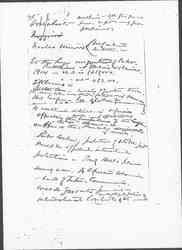
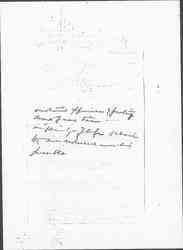
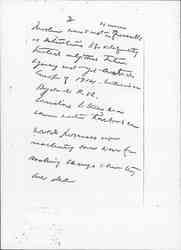
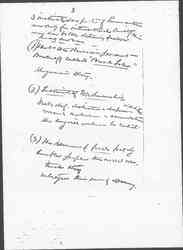
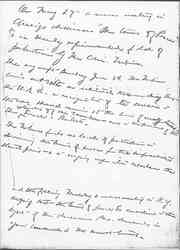
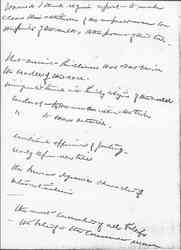
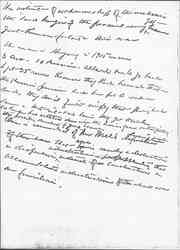
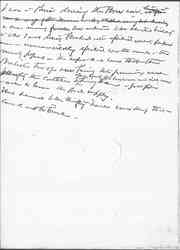
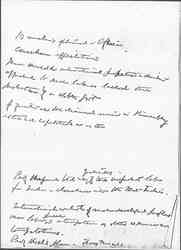
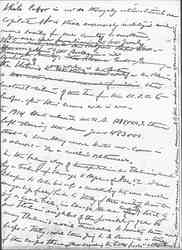












Comments